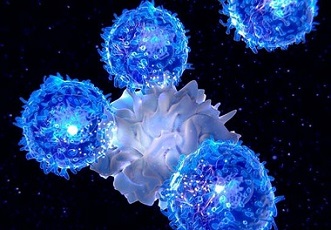Pro-Inflammatory Low Avidity SARS-CoV-2 Reactive And Terminally Differentiated CD8+ T Cells Contribute To Immunopathogenesis Of Long COVID!
Long-COVID - Pro-Inflammatory-Low-Avidity-CD8-T-Cells Jun 02, 2023 1 year, 10 months, 2 weeks, 4 days, 3 hours, 4 minutes ago
German Study sheds light on the persistent inflammatory response driving Long COVID
Long COVID, or post-acute sequelae of COVID-19 (PASC), has become a growing concern as a significant number of convalescent COVID-19 patients experience prolonged symptoms and complications. Researchers from multiple German institutions have conducted a groundbreaking study to explore the role of adaptive immunity in
Long COVID. Their findings provide valuable insights into the immunological factors contributing to this condition.
 The Study
The Study
Scientists from the University Duisburg-Essen, University Hospital of the Ruhr-University Bochum, CellTrend GmbH, Charité-Universitätsmedizin Berlin, and Charité – University Clinic Berlin collaborated to analyze the SARS-CoV-2-specific immune response in 40 Long COVID patients and 15 COVID-19 convalescent healthy donors. They employed pseudovirus neutralizing assays and multiparametric flow cytometry to investigate the immune cells involved in Long COVID.
Results
The study team found that while the frequencies of SARS-CoV-2-reactive CD4+ T cells were similar between the Long COVID patients and the control group, a distinct difference was observed in the CD8+ T cell response.
Long COVID patients exhibited a stronger CD8+ T cell response, characterized by the production of interferon-gamma (IFNγ) and the presence of a proinflammatory TEMRA phenotype. However, these CD8+ T cells demonstrated low functional T cell receptor (TCR) avidity.
Importantly, the study revealed that the Long COVID patients had comparable levels of high avidity SARS-CoV-2-reactive CD4+ and CD8+ T cells, indicating that their cellular antiviral response was intact. Additionally, the neutralizing capacity in Long COVID patients was not impaired compared to the control group, suggesting that the presence of neutralizing antibodies did not play a major role in Long COVID pathogenesis.
Implications and Significance
The study findings provide crucial insights into the immunopathogenesis of Long COVID. The expanded population of low avidity SARS-CoV-2 reactive CD8+ T cells, exhibiting a proinflammatory TEMRA phenotype, suggests their involvement in the persistent inflammatory response observed in Long COVID patients. These cells have the potential to cause tissue damage and contribute to the multisystemic symptoms seen in Long COVID.
The research highlights the importance of investigating immune dysregulation in Long COVID and its potential therapeutic implications. By understanding the underlying mechanisms, scientists aim to develop targeted therapies that alleviate the burden on individuals with Long COVID and improve their quality of life. Furthermore, the study emphasizes the need for further research, including animal models, to gain a comprehensive understanding of the immunological factors driving Long COVID.
Conclusion
As Long COVID cont
inues to affect a significant proportion of the population, understanding the immunological basis of this condition is of utmost importance. The study's findings demonstrate the involvement of low avidity circulating SARS-CoV-2 reactive CD8+ T cells with a proinflammatory TEMRA phenotype in the pathogenesis of Long COVID. These insights provide a foundation for future research and the development of therapeutic interventions aimed at mitigating the immune dysregulation associated with Long COVID. By unraveling the complexities of Long COVID, scientists move closer to improving the lives of those affected by this persistent post-acute sequela of COVID-19.
The study findings were published in the peer reviewed journal: Frontiers in Microbiology.
https://www.frontiersin.org/articles/10.3389/fmicb.2023.1196721/full
For the latest on
Long COVID, keep on logging to Thailand Medical News.
